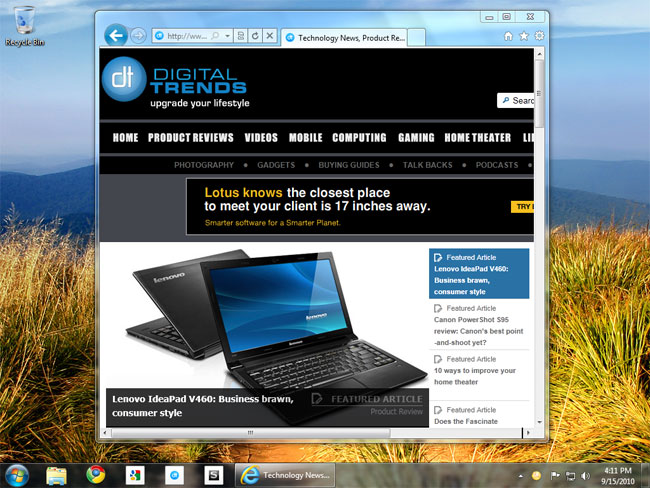Microsoft has a long history of creating and discontinuing beloved applications, leaving users with a sense of nostalgia for the technologies of yesteryear. In the latest blow to longtime Microsoft users, WordPad, the popular text editor app, has been conspicuously absent from the latest beta build of Windows 11, signaling the end of its 28-year journey. Many users have fond memories of using WordPad, especially as an affordable alternative to the pricey Microsoft Office suite during their college days.
But WordPad is just one of many applications that Microsoft has retired over the years. From pioneering productivity tools to nostalgic multimedia players, Microsoft has consigned several iconic applications to the annals of tech history.
One such iconic application is Internet Explorer, which emerged as a dominant web browser in the mid-1990s, gaining widespread popularity due to its integration with the Windows operating system. However, over time, it faced criticism for security vulnerabilities and slow performance, leading to a decline in usage. Competitors like Mozilla Firefox and Google Chrome eventually surpassed Internet Explorer in popularity, prompting Microsoft to transition to its own Edge browser. In 2022, Microsoft officially ended support for Internet Explorer in favor of Edge, marking the end of an era in web browsing history.
Another notable casualty is MSN Messenger, also known as Windows Live Messenger. This instant messaging application was once a global phenomenon, allowing users to chat in real-time, share files, and play games within the platform. However, with the rise of social media platforms and mobile messaging apps, such as Facebook Messenger and WhatsApp, MSN Messenger’s user base began to decline. In 2013, Microsoft officially discontinued MSN Messenger and encouraged users to migrate to Skype, another messaging platform acquired by Microsoft.
Additionally, Windows Movie Maker, a popular video editing software, faced the chopping block in 2017. Despite its widespread use among amateur video editors, Windows Movie Maker was criticized for its limited capabilities compared to professional video editing software. Microsoft officially discontinued support for Windows Movie Maker, removing it from the Windows Essentials suite, but it remains a nostalgic tool for many who fondly remember its role in creating and sharing personal videos during the early 2000s.
Similarly, Cortana, Microsoft’s virtual assistant, was introduced in 2014 with Windows Phone 8.1 and later integrated into Windows 10 and other Microsoft products. Despite its initial promise, Cortana faced stiff competition from established virtual assistants like Siri, Google Assistant, and Alexa. Microsoft ultimately shifted its focus away from consumer-focused features, scaling back third-party Cortana skills and removing Cortana from the Windows taskbar in 2021. Cortana reached the end of its life cycle in 2023, making way for Microsoft’s newest AI-based assistant, Copilot.
Wunderlist, a widely used task management app, was another casualty of Microsoft’s discontinuation trend. Known for its user-friendly interface and cross-platform compatibility, Wunderlist was acquired by Microsoft in 2015, leading to its ultimate retirement in favor of Microsoft To Do in 2020.
Furthermore, Microsoft Reader, an e-book reader application, faced stiff competition from other e-book reader software and devices, prompting its discontinuation in August 2012. Lastly, DriveSpace, a disk compression utility developed by Microsoft, met its end as advancements in storage technology diminished the need for disk compression utilities.
These retirements reflect the inevitable march of technological progress, with newer, more advanced solutions replacing older technologies. While users may feel a sense of nostalgia for these discontinued applications, it’s important to recognize that their retirement paves the way for newer, more innovative technologies to take their place.
In conclusion, Microsoft’s history is rich with the rise and fall of once-beloved applications. While the retirement of these applications may evoke feelings of nostalgia among longtime users, it also signifies the continuous evolution of technology. As users bid farewell to these iconic applications, they can look forward to embracing the new and innovative technologies that will inevitably take their place. It’s all part of the ever-changing landscape of tech, where progress and innovation go hand in hand.
My opinion on this matter is that while it is natural for companies to retire older technologies in favor of newer, more advanced solutions, it is essential for companies like Microsoft to ensure that the transition is seamless for users. Retirement of beloved applications can evoke feelings of nostalgia and disappointment among users who have relied on these technologies for years. Therefore, it is crucial for companies to provide adequate support and guidance to users during the transition period. Additionally, it is also important for companies to learn from the retirement of older technologies and apply those lessons to the development and maintenance of newer technologies, ensuring that they can withstand the test of time and changing user needs.


